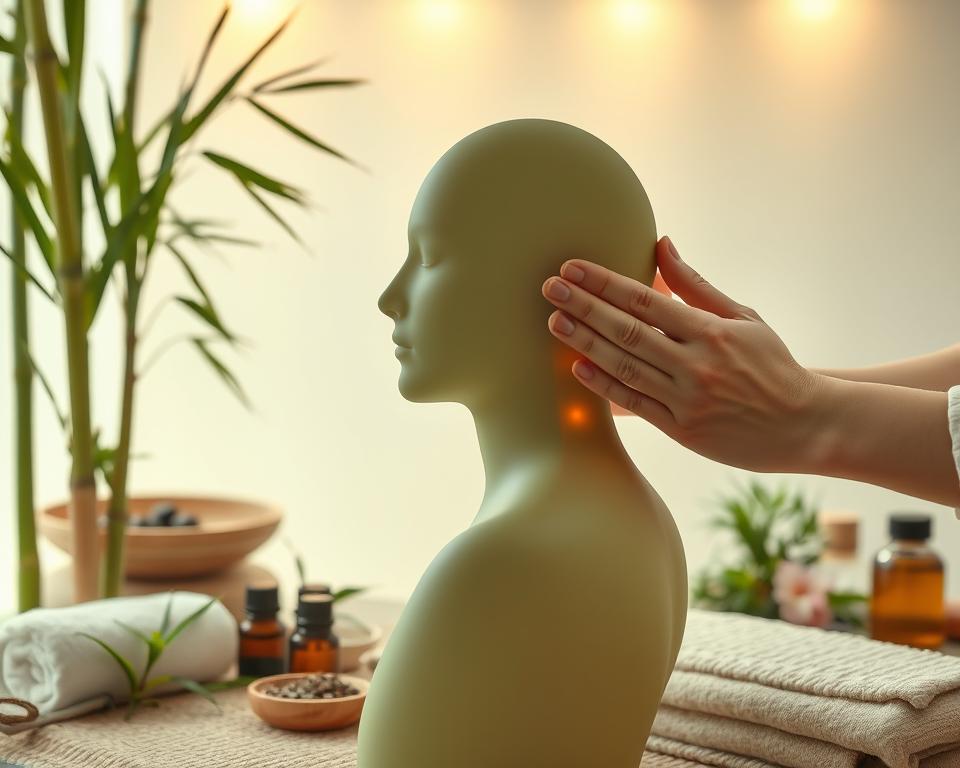Are you tired of dealing with a dry cough? Acupressure, a practice from Traditional Chinese Medicine (TCM), can help. This guide will show you how to use pressure points for natural relief. You’ll learn a holistic way to improve your breathing and overall health.
Acupressure has been around for centuries to help with many health issues, including dry coughs. By applying gentle pressure to certain points, you can help your body heal itself. Find out how this safe, drug-free method can help you breathe better and feel happier.
Let’s dive into why dry coughs happen, the problems with usual treatments, and how acupressure can help. You’ll get step-by-step instructions and natural remedies to improve your breathing. Start your journey to better health and a better life with acupressure.
Read more interesting information at ::zcr157602
Understanding Dry Cough and Its Causes
Dry cough is a common problem that can be caused by many things. Unlike a productive cough, which brings up mucus, a dry cough is just an annoying, hacking feeling. Knowing what causes dry cough helps find better ways to feel better.
Symptoms and Triggers
Symptoms of dry cough include a tickling or scratchy throat and a hoarse voice. You might also feel like you need to clear your throat a lot. Things like dust, smoke, or harsh weather can trigger it. So can some medicines, post-nasal drip, and conditions like asthma or dry cough symptoms.
Conventional Treatments and Their Limitations
Medicines you can buy over the counter, like cough suppressants and expectorants, might help a bit. But they can have side effects and don’t fix the real problem. Also, over-the-counter cough medicines might not work well for long-term dry cough. They can also interact with other drugs and may not be the best choice for everyone.
| Conventional Treatments | Limitations |
|---|---|
| Cough suppressants | Temporary relief, potential side effects |
| Expectorants | May not address underlying causes, limited effectiveness |
| Antihistamines | Can cause drowsiness, may not be suitable for long-term use |
Since traditional treatments have their limits, trying something like acupressure might be a better way to handle dry cough. It could help manage symptoms and find the root cause of the problem.
The Power of Acupressure for Dry Cough Relief
Acupressure is an ancient Chinese method that uses pressure on specific body points. It’s a natural way to help those with dry cough. By focusing on points linked to breathing, acupressure can tackle the cause of dry cough and offer lasting relief.
The ancient wisdom of traditional Chinese medicine (TCM) is behind acupressure. It aims to open up the body’s energy paths, called meridians. When these paths are clear, the body’s energy, or qi, flows better. This can improve breathing and help manage coughs.
Acupressure pressure point therapy is great for easing the causes of dry cough. It can reduce irritation, inflammation, and congestion in the lungs. By pressing certain points, acupressure relaxes muscles, eases mucus, and eases cough discomfort.
But there’s more to acupressure benefits than just quick cough relief. Regular use can also boost your body’s defenses. This makes your respiratory system stronger and more resilient against coughs. It’s a holistic way to treat the root of the problem, not just the symptoms.
If you’re looking for a natural cough remedy or want to improve your breathing, try acupressure pressure point therapy. Adding it to your daily routine can be a game-changer for lasting dry cough relief.
Acupressure Dry Cough: Targeted Pressure Points
Acupressure can help with dry cough by focusing on certain points. These points are on the lung meridian and the conception vessel. They help improve breathing and offer natural relief.
Lung Meridian Points
The lung meridian is key in Traditional Chinese Medicine for breathing. Pressing points on this meridian can improve energy flow and ease dry cough.
- LU1 (Zhongfu): At the chest’s center, it clears the lungs and eases coughing.
- LU5 (Chize): On the inner arm, it soothes the throat and lessens coughing.
- LU9 (Taiyuan): On the wrist, it strengthens the lungs and boosts breathing health.
Conception Vessel Points
The conception vessel, or ren meridian, also plays a big role in breathing. Certain points on this meridian can target relief for dry cough.
- CV12 (Zhongwan): At the abdomen’s center, it regulates lung qi and eases coughing.
- CV17 (Shanzhong): At the chest’s center, it opens the lungs and aids breathing.
- CV22 (Tiantu): At the neck’s base, it soothes the throat and reduces coughing.
By focusing on these acupressure points, you can use Traditional Chinese Medicine to naturally treat dry cough. This can help you find relief.
Step-by-Step Guide to Acupressure Dry Cough Relief
Discovering acupressure for dry cough relief can change your life. It uses pressure on certain body points to help your body heal. This guide will show you how to prepare and do acupressure for your dry cough.
Preparation and Technique
First, make a calm and comfy space. Choose a quiet spot where you can focus. Sit or lie down in a way that feels good and keeps your body supported.
- Find the right acupressure points. The lung meridian points and conception vessel points are great for dry cough.
- Use your finger pads to press these points gently but firmly. Hold for 2-3 minutes until you feel a slight tingling or warmth.
- Do this on each point, keeping the pressure and rhythm the same.
- Keep going for 10-15 minutes, or until your cough starts to feel better.
Being patient and consistent is key for acupressure to work for dry cough. It might take a few tries to find what works best for you. Keep trying, and you’ll find natural relief soon.
| Acupressure Technique | Benefits |
|---|---|
| Applying firm, steady pressure to key points | Stimulates the body’s natural healing processes to alleviate dry cough |
| Focusing on lung meridian and conception vessel points | Targets the specific areas associated with respiratory health |
| Consistent 10-15 minute sessions | Provides lasting relief and promotes long-term respiratory wellness |
“Acupressure is a powerful tool for addressing the root causes of dry cough, providing safe and effective relief without the potential side effects of conventional treatments.”
Complementary Natural Remedies for Dry Cough
Acupressure is great for dry cough relief, but there are more ways to help. Using natural remedies together can tackle your cough from all sides. This way, you can find lasting relief.
Herbal teas are a favorite for many. Drinking ginger, chamomile, or peppermint tea can soothe your throat and loosen mucus. These teas have anti-inflammatory and expectorant properties that help with coughing and healing.
Essential oils are also helpful for dry cough. Oils like eucalyptus, thyme, and lemon can be diffused or applied to the chest and throat. They provide a calming, decongestant effect that makes breathing easier and reduces coughing.
Honey is known for its cough-suppressing and throat-soothing abilities. A spoonful of pure, local honey in warm water or herbal tea is a simple yet effective remedy.
Adding these natural remedies to your acupressure routine can make a big difference. It creates a holistic approach to finding relief and improving respiratory health.
| Herbal Tea | Benefits for Dry Cough |
|---|---|
| Ginger | Anti-inflammatory, expectorant |
| Chamomile | Soothing, anti-inflammatory |
| Peppermint | Decongestant, expectorant |
“Incorporating natural remedies alongside acupressure can provide a comprehensive, holistic approach to finding relief and promoting overall respiratory wellness.”
The Benefits of Acupressure Dry Cough Treatment
Acupressure is an ancient Chinese healing art that helps with dry cough. It’s a natural way to get fast-acting relief and manage coughs in the long run. Learn how acupressure can change your respiratory health for the better.
Immediate and Long-Term Relief
For dry cough, quick symptom relief is key. Acupressure works on specific body points to start healing and calm airways. You might feel your cough lessen in just a few minutes.
But acupressure does more than just ease symptoms. It fixes the body’s energy flow to heal from the inside out. Regular use can lead to lasting cough relief and better breathing.
| Benefits of Acupressure for Dry Cough | Conventional Treatments |
|---|---|
| Fast-acting relief from cough symptoms | Slow-acting, may provide temporary relief |
| Addresses underlying causes for long-term management | Focuses on symptom suppression, not root causes |
| Natural, non-invasive approach with no side effects | May have unwanted side effects |
| Promotes overall respiratory health and well-being | Targets specific cough symptoms only |
Try acupressure for dry cough and see its benefits. This ancient method offers quick relief and long-term health benefits. It’s a holistic way to improve your respiratory health.

Acupressure Dry Cough: A Safe and Effective Alternative
Looking for a natural way to stop dry cough? Acupressure is a great choice. It’s an ancient Chinese therapy that uses pressure points to help with respiratory issues. It offers quick and lasting relief without the dangers of medicines.
Acupressure is safe. It doesn’t have the bad side effects that some cough medicines do. It works with your body’s healing powers. By pressing on certain points, it helps your body balance and control coughing better.
Studies show acupressure works well for dry cough. It can make coughing less severe and less often. This makes it a good alternative to medication for those wanting a natural health solution.
Adding acupressure to your health plan can help a lot. It can be part of a bigger plan that includes other natural therapies. This way, you can tackle the real causes of your dry cough and find lasting relief without just using medicines.
“Acupressure is a powerful tool that can help restore balance and harmony within the body, providing a gentle yet effective solution to a wide range of health concerns, including persistent dry cough.”
More people are looking for natural health options, and acupressure is becoming more popular. It’s a safe and effective way to manage respiratory health. By using acupressure, you can take charge of your health and improve your life quality.
Traditional Chinese Medicine and Respiratory Health
Traditional Chinese medicine (TCM) offers a holistic way to tackle respiratory health issues, like dry cough. It believes the body, mind, and spirit are connected. Imbalances in one can affect others.
Acupressure, a key part of TCM, is vital for respiratory health. It involves gentle pressure on body points to ease dry cough symptoms and boost respiratory health.
In TCM, the lungs are seen as the “delicate” organ, key for breathing. Lung meridian imbalances can cause respiratory problems, including dry cough. Acupressure on lung points helps restore balance and qi flow in the respiratory system.
- Acupressure for respiratory health: Applying gentle pressure to points along the lung meridian can help relieve dry cough and other respiratory symptoms.
- Holistic approach: Traditional Chinese medicine views the body as a interconnected system, addressing the root cause of respiratory issues rather than just the symptoms.
- Promoting balance: By restoring the flow of qi and supporting the lungs, acupressure and other TCM practices can contribute to overall respiratory well-being.
“In Chinese medicine, the lungs are considered the ‘delicate’ organ, responsible for the vital function of respiration. Imbalances in the lung meridian can lead to respiratory conditions like dry cough.”
By embracing traditional Chinese medicine and acupressure, people can find a holistic solution for dry cough and better respiratory health.
When to Seek Professional Help
Acupressure and natural remedies can help many people with dry cough. But, there are times when you need to see a doctor or an acupuncturist. If your cough is persistent or severe, it’s important to know when to seek help.
Here are some signs that mean you should see a doctor or an acupuncturist:
- Cough lasts more than 2-3 weeks without getting better
- Cough is with fever, chest pain, or trouble breathing
- Cough keeps you from doing daily activities or sleeping well
- Cough brings up thick, colored mucus or blood
- Cough doesn’t get better with home remedies or over-the-counter meds
If you notice any of these signs, it’s time to talk to a healthcare provider. This could be your primary care doctor or an acupuncturist. They can check what’s causing your cough and help you find the right treatment. They’ll also make sure there’s no serious problem and give you advice on how to manage your cough.
| When to See a Doctor for Dry Cough | When to Consult an Acupuncturist |
|---|---|
| Persistent cough lasting more than 2-3 weeks | Cough not responding to home remedies or acupressure |
| Cough accompanied by fever, chest pain, or difficulty breathing | Desire for a more holistic, natural approach to cough management |
| Cough disrupting daily activities and sleep | Interest in addressing the root cause of the cough through Traditional Chinese Medicine |
| Cough producing thick, colored mucus or blood | Need for personalized acupuncture treatment and herbal remedies |
Knowing when to get professional help is key to treating your dry cough right. This way, you can get the relief and health you need.

Incorporating Acupressure Dry Cough into Your Daily Routine
Adding acupressure to your daily life can change how you handle a dry cough. Spend a few minutes each day on specific acupressure spots. This can help you feel better and improve your health.
Begin by adding a daily acupressure routine to your morning or night. Just 5-10 minutes of pressing the right spots can help a lot. It can lessen how often and how bad your cough is.
Seamless Integration
It’s important to blend acupressure into your daily activities. Here are some tips:
- Do acupressure while working at your desk or on public transport.
- Add acupressure to your skincare or self-massage routine.
- Use a daily reminder on your phone or calendar for acupressure.
By making acupressure a regular part of your life, you can better manage your cough. You’ll also enjoy the lasting benefits of this natural wellness method.
| Acupressure Technique | Benefits |
|---|---|
| Pressing the Lung Meridian Point | Helps relieve dry cough, improve respiratory function, and reduce chest tightness. |
| Stimulating the Conception Vessel Points | Aids in regulating the body’s energy flow, promoting overall respiratory health. |
Consistency is crucial for making acupressure a daily habit. With some effort and commitment, you can easily include it in your self-care routine.
Acupressure Dry Cough: A Holistic Approach to Wellness
Acupressure is more than just a way to ease a dry cough. It’s a key part of a holistic approach to overall wellness. It helps keep the respiratory system healthy and boosts the body’s healing powers.
Acupressure targets special points on the body to alleviate symptoms, improve lung function, and strengthen the immune system. It’s a great addition to a lifestyle focused on holistic health and wellbeing.
People can also try other natural remedies and lifestyle changes to help their health. These might include:
- Practicing mindfulness meditation to reduce stress and inflammation
- Incorporating aromatherapy with essential oils known for their respiratory benefits
- Engaging in regular physical activity to strengthen the lungs and boost immunity
- Maintaining a balanced, nutrient-rich diet to provide the body with the necessary resources for healing and resilience
By using acupressure for overall wellness, people can start a journey towards better respiratory health. This ancient practice can be a powerful tool for integrative medicine. It helps address the root causes of dry cough and promotes overall wellbeing.
“Acupressure is not just about relieving symptoms, but about restoring balance and harmony within the body and mind.”
| Benefits of Acupressure for Holistic Wellness | Impacts |
|---|---|
| Respiratory Health | Improved lung function, reduced inflammation, and enhanced immunity |
| Stress Management | Decreased anxiety, improved sleep, and better emotional regulation |
| Immune System Support | Increased resilience, faster recovery from illness, and overall wellbeing |
Conclusion
In this article, we’ve looked at how acupressure can help with dry cough. We’ve seen how it’s a natural way to feel better. It’s especially useful when other treatments don’t work well.
Acupressure targets key points to help with dry cough. It works on the lung and conception vessel meridians. By following our guide, you can help your respiratory health and ease dry cough discomfort.
Acupressure is a natural way to manage dry cough. It’s easy to add to your daily routine. This method is safe and can be a great addition to your health care. With regular practice, you can improve your breathing and overall health.
